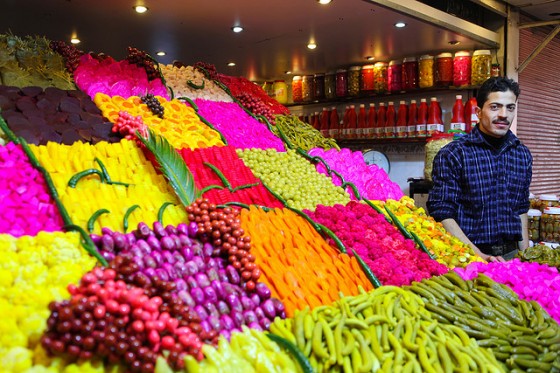 Syrian’s police and vegetable vendors play a game of cat-and-mouse; will authorities find a way to let the market prevail?
Syrian’s police and vegetable vendors play a game of cat-and-mouse; will authorities find a way to let the market prevail?
With its campaign against plastic bags and its shiny new renewable energy plan, Syria’s environmental esteem is rising high. Moshe’s weekly flight to the greater Middle Eastern blogosphere demonstrates all kinds of awareness from Damascus and beyond. But what about Syria’s police force? Recently they’ve been raiding veggie vendors in the streets, either confiscating their produce or levying fines, ostensibly to reduce congestion. Even so, locals say the risk is worthwhile.
License to sell
The license to sell vegetables on the streets of Damascus costs approximately $1,100, according to Ryan Gerty and Rassa Qass Yousef. While this may be affordable for certain shop owners, it isn’t for most people trying to make a living from their agricultural pursuits.
“The small vendors would…like to see the government offer more affordable licenses, which would allow them to more easily comply with the law,” Gerty and Yousef write.
As a result of these high prices, small vendors – some are women who come from outside of Damascus with only a basket or two of vegetables to sell, another man with a horse and cart sells mellons – risk either fines or confiscation. The man with the cart recently lost his weights and balance to the police, and might lose his cart if he continues to sell his mellons on the street.
He told the magazine, “I worry, but I have to work.”
Risky business
Despite having a legitimate space in which to sell their merchandise, even the shop owners are willing to risk the fine.
A … pickle shop has been forced to close twice in the last five years. The closure cost the shopkeeper approximately 5,000 SP (approximately $100) in lost business in addition to the payment of the fine. The owner says that the fines are fair, and thinks of the fine as rent payment for the sidewalk space. Still, he would prefer to have a sidewalk license, so as to avoid risk of closure.
The risks are worthwhile to vendors and shopkeepers-though shopkeepers prefer to lose produce rather than receive fines since three tickets leads to closure-because sidewalk sales are so much more lucrative than indoors. The supply is meeting a demand, and its competitive.
Cat and mouse
Though one veteran of Souq al Hal called the interactions between police and vendor a cat and mouse game, both sides appear to be understanding of the other side’s restraints.
Even so, it seems authorities should recognize that the market will prevail and learn how to accommodate or better control the menagerie.
“One vendor, who has been arrested several times, suggested that the city authorities create more appropriate places for small street vendors to sell their products,” says Gerety and Qass Yousef.
:: image via Paul Keller and story via Forward Magazine
More new from Syria:



